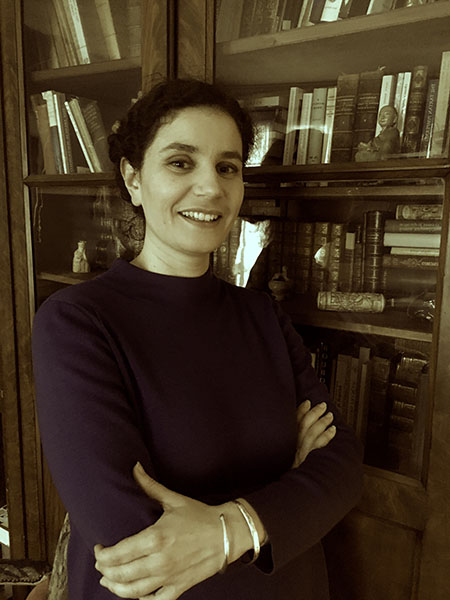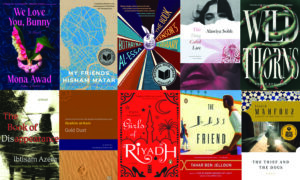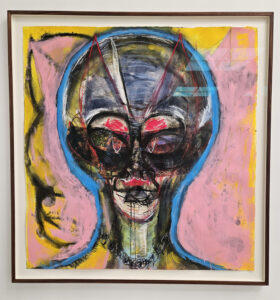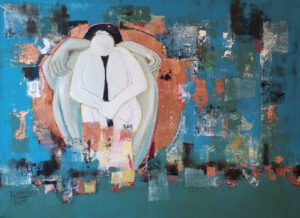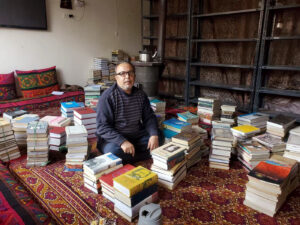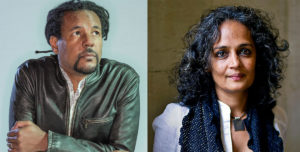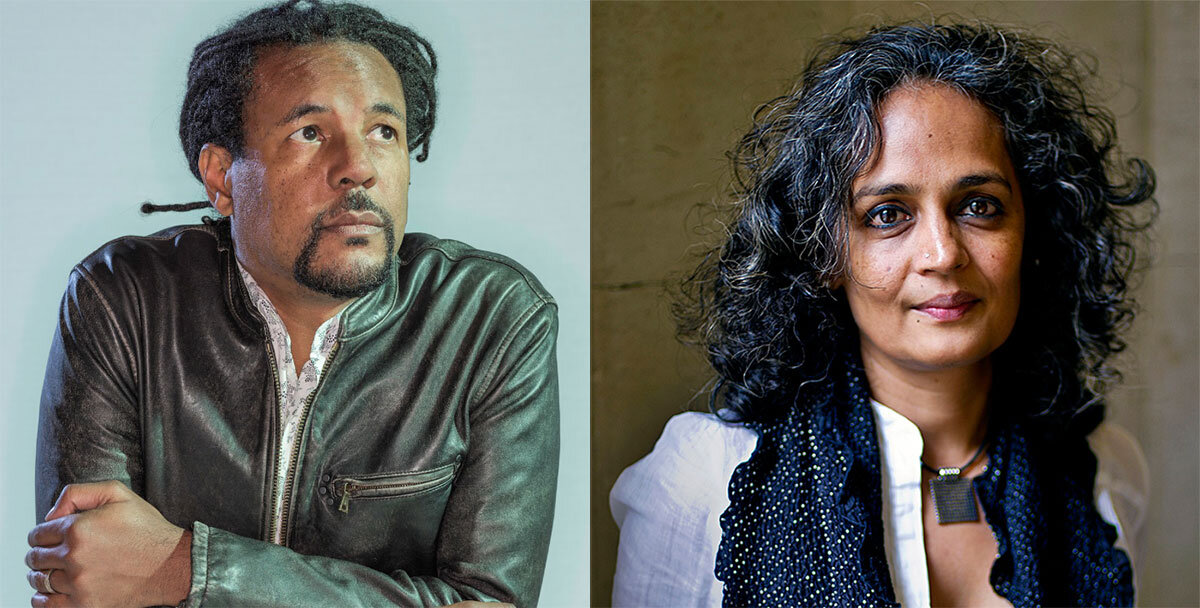
As part of the Brooklyn Book Festival, Indian and American authors Arundhati Roy and Colson Whitehead were invited to read from their work and to discuss “What Lies Ahead.” Both have new books out. The reading, followed by a conversation, showed how much the two largest democracies in the world, currently deeply challenged, have in common.
Melissa Chemam
Arundhati Roy has been issuing a siren call to the world against India’s fascist government for several years, while Colson Whitehead, as a New York writer in the Black community, has been confronted with decades of police brutality, as well as the advent of President Donald Trump, who openly embraces white nationalists.
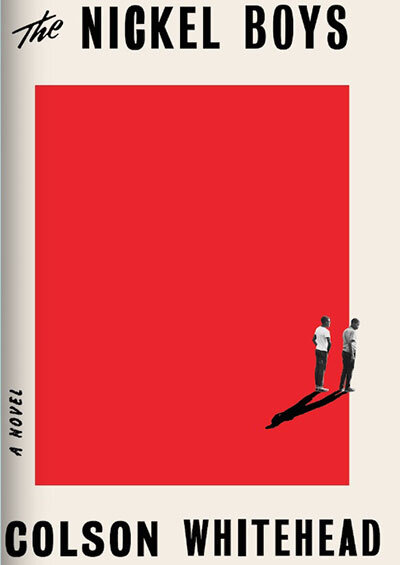
In a virtual conversation that took place on October 4th, summarizing what for her are the commonalities between her work and that of Whitehead, author of the Pulitzer-Prize winning novels Underground Railroad and The Nickel Boys, Arundhati Roy—author of The God of Small Things and The Ministry of Utmost Happiness—mused, “It is, sadly, the writer’s fate to look at things with aching eyes, and not to blink…It’s the writer’s fate to look at the world’s fate.”
The two immensely talented writers couldn’t be further apart, as some 11,000 kilometers lie between New Dehli, India and Long Island, New York where each resides and from where each spoke remotely. Yet even as you factor in their different experiences in life, and their varied texts, when you listen to them concomitantly, the whole world starts to make sense.
For Roy, the current situation is the result of the 2,000-year-old Indian caste system, as much as an effect of 200 years of brutal British colonial rule—a reality she compared with the United States. “These two countries are built on denying the horrors of what they consider to be civilization. That’s what connects writers like Colson and myself.
“[Whitehead’s] Underground Railroad haunted me for years,” she said after Whitehead read from his work, “first because it’s so beautifully written and so powerful.” She cited anti-caste writers before her who have pointed out the connections between slavery in the US, the caste system in India and apartheid in South Africa. “However, there is no underground escape for any victim of the caste system here in India. There is no way to run away from it. Here, peoples’ minds are so vertical, so hierarchical, that Indians don’t know how to make it horizontal and create solidarity.”
To these thoughts, Whitehead responded that his novels always depict power structures and their violence, from slavery to our days, because these have to be uncovered. “I have to be all in,” he added, to confront the truth of what is country has remained.
Both writers have been challenged by the events of 2020, whether the current pandemic or the Black Lives Matter protests.
“For me, unfortunately, the current level of racism in America just proceeds from the same old business against Black people,” lamented Whitehead. “I grew up in New York in the ‘80s, when we’d have a famous case every three years…Police brutality hasn’t changed, even if now it is getting filmed on cell phones and these videos are seen by millions of people… When my books came out in Spain and in France, readers wrote me that they found them so prescient. But how could they be to me? This has happened so many times. America has remained the same.”
And the Covid-19 pandemic only amplified inequalities in the United States.
Arundhati Roy concurred as she compared the situation in India. “The pandemic was like an autopsy of a place in deep trouble: the lockdown forced ten million people to walk thousands of kilometers in one of the largest displacements in our recent history. In India a lockdown doesn’t insure social distancing, only some physical compressing. It only made things worse… Meanwhile, many violations of our rights are occurring daily. Just five minutes from my house [in New Delhi], there is a notorious police station, where friends I’ve known for years are being held, are being interrogated; there’s a massive sweep of arrests of all activists who rose up against the anti-Muslim citizenship law. As you know, there have been hundreds of Muslims lynched by mobs which are filmed and put up on YouTube.”
Brooklyn Book Festival moderator Anderson Tepper asked the two authors how the pandemic had affected their writing, a question that seemed to put Roy in disarray. She blamed the lockdown for an inability to easily articulate the many crises India is facing. “It’s like there are firing squads everywhere,” she said.
Tepper also wondered how Roy reacted after her essay in the Financial Times, “The Pandemic Is A Portal” circled the world across the net in April, almost like a calming mantra. In that piece, Roy wrote about the privatization of healthcare in India and how the free market is wreaking havoc among the less fortunate. But she also wrote:
Who can think of kissing a stranger, jumping on to a bus or sending their child to school without feeling real fear? Who can think of ordinary pleasure and not assess its risk? Who among us is not a quack epidemiologist, virologist, statistician and prophet? Which scientist or doctor is not secretly praying for a miracle? Which priest is not — secretly, at least — submitting to science?
“Yet,” she reckoned, appalled, “most people only quoted the last paragraph from that long essay.”
“Historically,” she wrote at the end of the column, “pandemics have forced humans to break with the past and imagine their world anew. This one is no different. It is a portal, a gateway between one world and the next.”
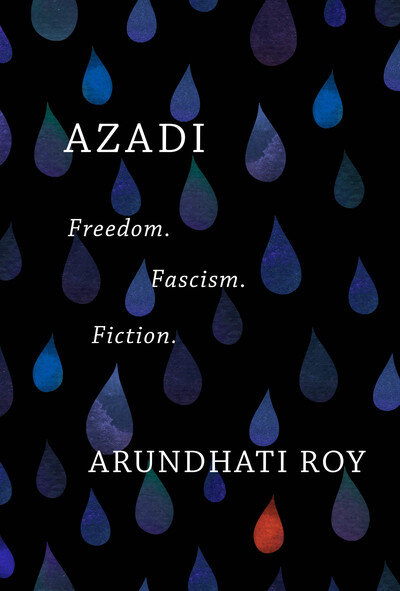
Yet for now she’s observed that in her country, the pandemic has only been “a portal for decisions that shouldn’t be made. The Indian government has suddenly changed the laws for agriculture, corporatized farming and privatized mining. The main point of my writing is about the violence, the privatization of healthcare, the lack of hospitals in India…That has happened to a lot of my writing: people take a quote from it and forget the main points.”
She cannot say she remains optimistic, though social media responses to her essay suggest that she is. That’s why she started writing political essays in the first place, after the release of The God of Small Things, facing praise for the novel but harsh backlash for her opinions. Her writing is now a weapon to fight the new nationalistic Hindu project. “It’s too hard to have other long-term plans,” she admitted during this online event.
Her new collection of essays, Azadi: Freedom. Fascism. Fiction, published by Haymarket Books this fall, helps us find parallels in the numerous cases of extreme rightwing fascism all over the world, from the US to Turkey and Brazil. It includes texts and lectures written over the past two years.
The first roots of nationalism in South Asia, the book reminds us, were consequences of the post-colonial era—India obtained its independence from the British Empire in 1947 at the cost of a partition with Pakistan and Bangladesh, along with deadly wars and huge shifts of populations, now responsible for Muslim-Hindu hatred. The politics of nationalism also resulted in an increasing differentiation in the languages themselves, in the former “Hindustan” into two separate ones, with discrete scripts—now called Hindi and Urdu—which enabled more discrimination.
The other root cause of the rise of violence emerged slowly after the collapse of the Soviet Union, when India’s alliance with the US opened wider doors to a stronger, more destructive form of capitalism.
Like many other observers, Roy hoped that Modi wouldn’t be reelected in 2019. But he was. “Only a year into his second term,” Roy wrote in the Paris Review in September this year, “through a series of horrifying moves, Modi has changed India beyond recognition. The infrastructure of fascism is staring us in the face, the pandemic is speeding up that process in unimaginable ways, and yet we hesitate to call it by its name.” And she can only see parallels with the situation in the United States.
Roy sees writing as a form of response. “My mind is in a mess right now! I haven’t found a way to write further about all this at the moment; there are so many crises on so many levels.” But when asked, “What lies ahead?” Roy pondered…and finally replied: “Reimagining the world. Only that.” And who could disagree?
As for Colson Whitehead, he tries to remain optimistic. “If I thought Donald Trump were to be re-elected again in November, I’d probably go insane,” he told The Observer recently. “So, I have to think it won’t happen for my own sanity’s sake and for my children’s futures. One wants to be cautiously optimistic that these protests will make something happen, but also they might not.”
His new novel, Harlem Shuffle, will be published in 2021, and he’s already started working on another one. “There is always a fear of screwing up,” he confessed, “but I’m still doing the work. My anxiety has become some good quality control.”
These days—like the main character in her novel The Ministry of Utmost Happiness, Arundhati Roy remains anxious about the future of India’s communities, especially for the new generation, increasingly divided by Modi’s fascist and anti-Muslim rhetoric. As for Colson Whitehead, we will revisit with him on matters of anti-Black racism, police brutality and the neo-fascism of Donald Trump, after November 3rd.




